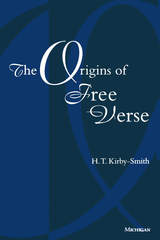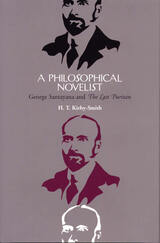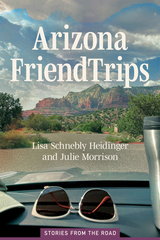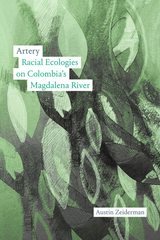
Though free verse became a dominant poetic mode only in the twentieth century, Kirby-Smith finds its roots in seventeenth-century England. Beginning his study with writers such as John Milton--who was considered by T. S. Eliot to be the greatest writer of free verse in English--the author places recent and divisive topics in poetics in context, showing them to be attenuated remnants of issues first broached hundreds of years ago.
The book seeks to establish a consensus on the nature of free verse, with reference to critics and poets including Pound, Eliot, Williams, Amy Lowell, Yvor Winters, and Hugh Kenner. Good free verse, argues Kirby-Smith, arises as a reaction to a well-established set of conventions. Likewise, The Origins of Free Verse goes against the conventions of existing poetic scholarship, offering an encompassing yet fresh--and controversial--literary history of free verse.
"At moments, this study is revelatory. . . . In its range and detail it offers a way of thinking about the history of English-language prosody which recognizes the importance of the poet's individual choices and undercuts our century's vanity. . . . Poetry is a learned art, and Kirby-Smith brings both insight and much learning to reading it." --Times Literary Supplement
"The best study of free verse I have seen. . . . The Origins of Free Verse is a book that all students of prosody will want to read. " --Harvard Review
". . . a witty and polemical account of the emergence and development of free verse." --Choice
H. T. Kirby-Smith is Professor of English, University of North Carolina at Greensboro.

H. T. Kirby-Smith uses Santayana’s 1936 novel, The Last Puritan, as both an occasion and a means for bringing into focus the complex relations between Santayana’s life, his personality, and his philosophy. Opening with an account of Santayana’s various literary styles and arguing for the significance of Santayana’s writing of philosophy as literature, Kirby-Smith notes that Santayana saw the rational life as a continual adjustment and accommodation of contradictory claims. And he saw a literary style as an accommodation of the author to the reader.
Chapters 2 through 5 provide the philosophical background for a consideration of The Last Puritan, summarizing exactly how Santayana assimilated other philosophies into his own.
Chapters 6 and 7 incorporate Santayana’s three-volume autobiography, his letters and memoirs, and biographical studies by others into a psychological portrait of the author. All of this is in preparation for chapters 8 and 9, which focus on The Last Puritan. Kirby-Smith closes with a chapter that serves as a legal brief in defense of the author against the harsh, sometimes malicious attacks of his critics.
READERS
Browse our collection.
PUBLISHERS
See BiblioVault's publisher services.
STUDENT SERVICES
Files for college accessibility offices.
UChicago Accessibility Resources
home | accessibility | search | about | contact us
BiblioVault ® 2001 - 2025
The University of Chicago Press









